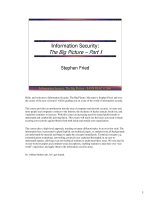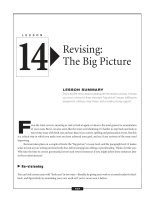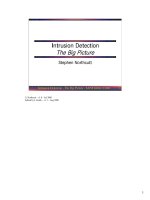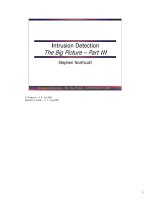Big picture main text
Bạn đang xem bản rút gọn của tài liệu. Xem và tải ngay bản đầy đủ của tài liệu tại đây (57.93 KB, 0 trang )
Big Picture Main Text
Hello, this is AJ. Welcome to the next lesson. This one is called “The Big Picture.” And
it comes again from a book called The Big Picture. And The Big Picture is by a man
named Dennis Littky. Now Littky is spelled L-i-t-t-k-y, Dennis Littky. The name of the
book is The Big Picture. I love this book. This is a book about education and Mr. Littky
is an extremely interesting guy. He is just a fantastic teacher, a fantastic educator.
Mr. Littky used to be a teacher and then he became a principal of a middle school.
Actually I think he started as a principal of an elementary school and then later a middle
school, public school, just a normal public government school. Well, he created an
incredible school at his first school, just an amazing school. There were articles written
about his school. It just became so famous because this school had a lot of low income
students, students from poor families. So this was not in some rich neighborhood with a
lot of money. And before Mr. Littky became the principal, the school was having a lot of
problems.
But he came in and he changed everything. He changed the teachers. He hired only
passionate, excited, energetic teachers, but not only that. He changed the whole
system. He stopped focusing on testing. He stopped focusing on grades. He focused
on the students as human beings. He wanted his students to grow as people. Not just
to memorize a bunch of facts, but to really learn how to think. And even more
importantly how to use their thinking and use their knowledge. So for example, most of
his classes were project‑based. In other words, the students did not study textbooks
and take tests, no, no, no. What they did is they created a project. And each project
was individual. Each student chose a project or projects based on their own interests.
And of course the teachers helped to guide these projects and structure them.
So for example, if one child really loved dinosaurs they would create a project about
dinosaurs. The teachers, the math teachers, the science teachers, etc., the English
teachers, would help that student learn math, learn science, learn English, learn history,
learn everything, all focused on dinosaurs because this kid loved dinosaurs. So they
would use dinosaurs to teach math, for example. Maybe they had to learn how to
calculate the size of a dinosaur’s bones or something. I don’t know exactly how they did
it, but they used the students’ individual passions to teach. And the students had to do
these incredibly, amazing, huge, difficult projects. These were not easy. They were
really tough. But the kids were very passionate about what they were doing.
And another thing that Dennis Littky did, he involved the community. His school had
mentors, advisors, helpers, from the community…parents, especially parents, but also
experts. So for example, if a kid really loved dinosaurs or maybe a whole class was
really interested in dinosaurs, they brought experts from museums, from universities to
www.EffortlessEnglishClub.com
teach these kids very advanced stuff about dinosaurs, including math and science,
everything.
And so the kids were so excited. They learned to love learning again. They became
passionate about learning. No more bullshit tests. At the end of their big projects they
had to give demonstrations, presentations. This is what happens in the real world,
right? If you’re at a job you don’t take a test…A, B, C, D. What you usually do is you
have some project at your job and when you finish the project you present the project to
your customers or to your boss or to somebody. You stand up or in writing you have to
present “Here’s what I did. Here were the results.” Well, that’s what the kids do. In
front of all the class, including parents, they stand up and they give these long
demonstrations, exhibitions, presentations. And that’s how they’re graded, based on
their presentations, based on what they learned…not some stupid test.
The most powerful thing about this is, guess what? These students still had to take
certain tests. The government said they must take them. His students were fantastic
on the tests. They never took tests during their normal school time. They never
focused on the tests. They never prepared for the tests. But what happened is these
kids learned to love learning. They learned so much more with his methods. And his
school became the top school in the state on the tests, even on the tests…interesting.
Whereas the other schools that were focused on the test…test, test, test, test…all the
time, textbooks and tests, textbooks and tests, they actually performed less well even
on the tests. What’s even worse is the normal schools, not only did they worse on the
tests, the kids were bored. They didn’t like learning. The teachers had no energy.
They were bored. It’s just amazing.
Now even better, here’s what Dennis Littky did after that. He decided he still couldn’t do
everything he wanted to do at a public school so he created his own schools. They’re
called the Met schools, M-e-t. And these Met schools are private schools. However,
they are not private schools for rich people. In fact, most of the students are poor, not
rich. But they’re still very tough. They don’t accept everybody. They have to interview
to get into the school. Every student has to interview to get into the school. They have
to talk about their passions. They have to talk about why they want to join the school.
There has to be some motivation for the students and the parents.
The parents also have to interview. It’s not about money, it’s about passion. And these
schools are absolutely fantastic. They’re probably the best schools in the United States.
He’s got a high school and a middle school…I don’t know…I think he has an elementary
school, too. I don’t know, they’ve got different schools around the country now. I’m not
sure how many. He’s got a website. Do a search for Dennis Littky or for The Big
Picture and you can read more about it.
So anyway, in his book he writes a little bit about learning. It’s a fantastic book. If
you’re a teacher or if you’re a parent, I highly recommend this book. Let me read a little
bit from the book. Here we go:
www.EffortlessEnglishClub.com
“Real learning is not memorizing knowledge. It’s understanding
and knowing how to use and find knowledge. Learning is what you
do with knowledge, how you integrate it, how you talk to your family,
friends and classmates about it. That’s what learning is. As noted
psychology and education expert Seymour Sarason reminded me
recently, it’s similar to psychologist’s belief that patients don’t get
better during their therapy but between their therapy times.
Students likewise don’t learn so much during class as they do
between classes. That’s where the real learning happens. Now,
I’m not suggesting we throw out everything schools do now, but I’m
suggesting that we look more deeply at what we define as learning.
I’m suggesting we be honest and try different things and see what
works. Learning is about learning how to think.
My new friend, Tom Magliozzi, from National Public Radio’s popular
Car Talk show has a lot to say about what learning really is. One of
my favorite parts of his book is when Tom, a man with a Ph.D. in
chemical engineering from MIT says this: ‘It seems to me that
schools primarily teach kids how to take tests which is a skill that
one hardly uses in real life unless one is a contestant on a quiz
show. Elementary school prepares kids for junior high. Junior high
prepares them for high school. High school prepares them for
university. University prepares them for graduate school. So the
goal of schools, if we can call it that, is simply to prepare kids for
more school.’
Okay, so interesting, huh? Very nice, I love that section of his book. I love his whole
book. But he’s absolutely right. The traditional schools you went to when you learned
English in middle school or high school or university, they were the same. They were
not preparing you for life. They were not teaching you how to learn. They were
certainly not helping your passion. They were not increasing your passion for learning.
Probably they were killing your passion for learning. All that schools were really doing
were preparing you for more school. They were preparing you to take tests. Guess
what. When you leave school, do you take many tests? At your job right now…do you
take tests every day, every week? Do they give you a test…choose A, B, C, D? And
your boss gives you a grade, “Oh, congratulations, you got a 90% on your test. Here’s
more money for your job.” Of course not.
School is sort of a bullshit environment that is only appropriate for school. That’s why
we have so many bored students. That’s why students hate school. It’s not because of
the internet. It’s not because of TV. It’s because kids are smart. Maybe they’re smarter
now today, I don’t know. Kids are smart. They know that what’s happening in school is
bullshit. They know their classes are bullshit. They know their teachers are also full of
shit. I mean I figured that out when I was in middle school, I think. I was a slow learner.
It took me a long time to figure it out. A lot of smart kids today, they figure it out when
they’re in first grade or they’re really young.
www.EffortlessEnglishClub.com
But it’s true, what you learn in school, how much of what you learned in school do you
actually use now? I’m glad I learned to read. I’m glad I learned basic math. Other than
that, most of what I find useful in terms of knowledge, in terms of skills, in terms of
abilities, I learned by myself. I learned because I love learning, because I have read so
many books outside of school. And I have met so many great teachers outside of
school. That’s where all my incredible learning has happened. Not in school.
So it’s just terrible what we’re doing with education. It’s all over the world. It’s in the
United States. It’s horrible. I taught in public schools in Japan. They are terrible.
They’re terrible in Thailand. They’re terrible in Europe. They’re terrible everywhere,
because they’re focused on tests. They’re focused on preparing kids for more school.
And then you get out in the real world. You get out in the world of jobs and suddenly
you have to do something completely different. Suddenly you have to actually perform.
You actually have to do things. You have to communicate. You have to have good
relations with other people. You have to learn by yourself. You have to do research.
You have to find the knowledge.
And you have to have, most of all, some kind of energy and passion and leadership.
That’s what success is in the real world. That’s what gives you success in the real
world. In school those things get punished. Passion in school, that’s usually the kid
who’s getting in trouble all the time. The kid who has too much energy, the kid who has
too much passion, right? The kid who asks too many questions, they get in trouble.
The kids who sit there quietly, bored, doing what they’re told. They do well in school.
They do very badly in the real world.
So Dennis Littky is saying we’ve gotta change our schools. We’re not living in the 19th
century anymore. We’re not living in the 20th century anymore. We’re not preparing
kids for factories now. We need kids and adults to be able to think creatively,
imaginatively. We need people who can communicate, who can stand up in front of a
group and communicate with intelligence and passion. People who can create things,
people who can build teams, people who know how to find knowledge…you don’t need
to memorize it. You just need to be able to find it. Albert Einstein talked a lot about that.
He said intelligence is being able to find knowledge, knowing how to find it. Not
memorizing it. For example, phone numbers. You don’t need to memorize the phone
book. You just need to know how to use it. And the internet is a great tool for that. We
don’t have to memorize all these facts. If I want to know a fact from U.S. history, I don’t
need to memorize it. I can just get on the internet and find it. When was the American
Declaration of Independence signed, what exact day? Well, we all learn that in school
and of course we all know that. But if I didn’t know it, I could get on the internet, I could
find it in about 30 seconds. You could, even if you’re from any country in the world, you
never learn that. Very easy for you to find that information.
So what we have to be doing is learning how to find facts, not trying to memorize them.
That’s why we have computers. What we have to focus on is learning how to use our
www.EffortlessEnglishClub.com
brains. Learning how to learn, learning how to find knowledge, learning how our brains
work, that’s what we really need to do. That’s true learning. And that’s what we’re
trying to do. That’s what I’m trying to do at Effortless English for you, adult learners.
Most of you unfortunately have been through a lot of bad school experiences. You’ve
been through these horrible schools.
Well, I’m trying to destroy those experiences. I’m trying to give you something
completely new and different. I am trying to awaken your passion for learning again.
That is my mission. That’s why I’m yelling. That’s why I jump around. That’s why I
have so much energy in my voice. That’s why I tell these crazy stories. It’s because I’m
trying to wake you up. Wake up! Learning is incredible. It’s not school. It’s not that
bullshit. Learning is what you are naturally programmed to do. It’s what your brain
wants to do. Your soul wants to learn. So I hope I’m doing a good job. I’m sorry I’ve
been yelling all the time but I hope I’m doing that. I hope I’m waking up your desire,
your love for learning.
Alright, I will see you next time. On to the vocabulary lesson.
www.EffortlessEnglishClub.com









